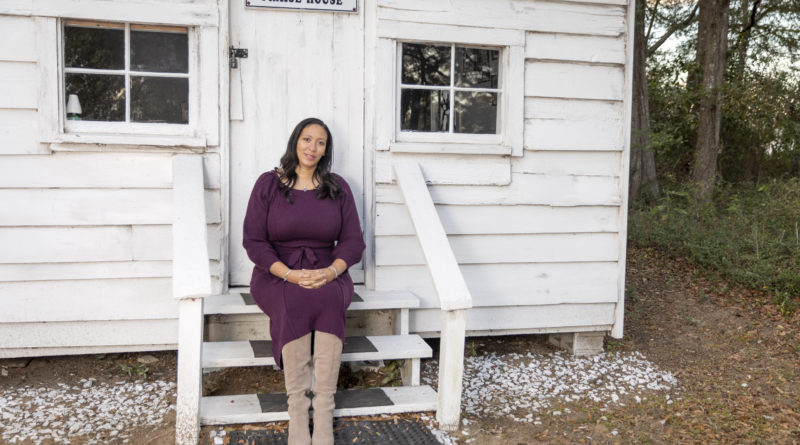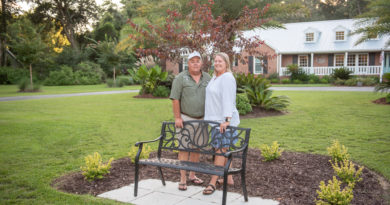Victoria Smalls
Executive Director of the Gullah Geechee Cultural Heritage Corridor
story by KATE HAMILTON PARDEE photos by PAUL NURNBERG
The Oxford Language Dictionary describes Gullah as “a number of black people living on the coast of South Carolina and nearby Islands.” The dictionary description only scratches the surface upon meeting — Victoria Smalls of St. Helena Island, South Carolina, and learning more about the Gullah culture.
The spiritual influences of Victoria’s traditional Gullah upbringing have greatly influenced her life and career, preparing Victoria for her current role as Executive Director at the Gullah Geechee Cultural Heritage Corridor.
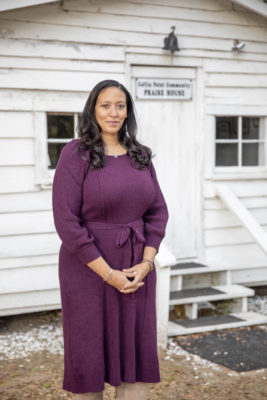 Victoria was born to Laura Markovich and Elting B. Smalls. Her parents, both widowers when they met at a Baha’i faith conference, found a mutual attraction and decided to get married after courting. As an interracial couple, marriage was illegal in South Carolina and needed the parents’ approval per the belief of family unity in the Baha’i faith. They married in Michigan and moved back to the Tom Fripp community on St. Helena Island. Her father brought six children to the family from his first marriage, her mother brought four children, and Elting and Laura had four more children together, including Victoria. “We were never called stepchildren but were a beautiful blended family. We embraced our brothers and sisters. We are all one family,” says Victoria.”
Victoria was born to Laura Markovich and Elting B. Smalls. Her parents, both widowers when they met at a Baha’i faith conference, found a mutual attraction and decided to get married after courting. As an interracial couple, marriage was illegal in South Carolina and needed the parents’ approval per the belief of family unity in the Baha’i faith. They married in Michigan and moved back to the Tom Fripp community on St. Helena Island. Her father brought six children to the family from his first marriage, her mother brought four children, and Elting and Laura had four more children together, including Victoria. “We were never called stepchildren but were a beautiful blended family. We embraced our brothers and sisters. We are all one family,” says Victoria.”
Victoria and her siblings grew up on twenty of the fifty-nine acres of farmland her second great-grandparents purchased at federal tax sales allowing the Smalls, formerly enslaved people, to own land after President Lincoln’s Emancipation Proclamation took effect. Her West African ancestors arrived upon the shores of St. Helena Island as enslaved people, purchased for their expertise and skills in harvesting cotton, indigo, and their mastery of rice. The West Africans shared their knowledge with plantation owners who had fertile land but not the skills needed to farm them. Included in this Gullah culture was the legacy of their food and arts, language, and spiritualism. Most importantly, Victoria learned their unshakeable belief: It takes a village to raise a child and build a community.
After attending local Beaufort schools, South Carolina State University, Technical College of the Lowcountry, and the University of South Carolina-Beaufort, her first job was as a teacher’s assistant at Lady’s Island Elementary School. In 2012, she began her career at the Penn School, where her relationship with the school has a generational history. Her second great-grandparents, Adam and Besty Smalls, had sold Laura Town, founder of the Penn School, a piece of land to start a farm school. “I believe this is where my family’s first relationship began with the school,” Victoria says. “My father also graduated from the Penn School in 1943 and served on the Board of Trustees for the Penn Center.” Although Victoria’s father passed many years ago, she fondly reveals, “He is very proud of me.” In the Baha’i faith, departed souls continue their service to humankind and give support to you. She added, “Asking for his guidance, I would feel his spirit wash over me, making his presence known.”
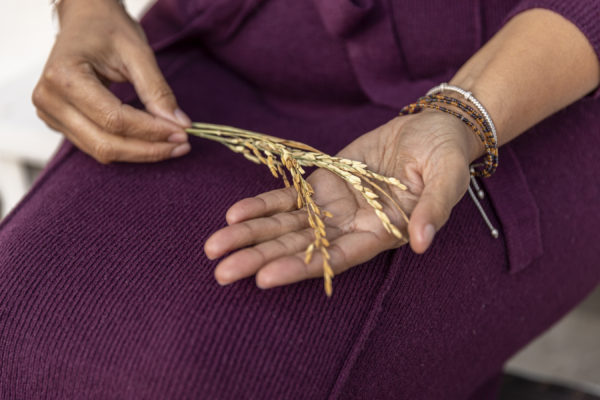
Victoria worked in Development, Public Relations, Program Development, and as a Museum Director, focusing on educational history, art, and cultural outreach.
Victoria felt her most significant contribution was “becoming a strategic partner in Gullah Geechee communities.” She worked with organizations to fulfill her goals. “Working at the Penn Center instilled a great understanding of the importance of these collaborations and how much they are needed,” shares Victoria.
The United States Secretary of the Interior appointed Victoria to become a commissioner on the Gullah Geechee Cultural Heritage Corridor. The National Federal Organization has a mission to promote and educate the Heritage Corridor, an area that recognizes the unique cultures of the Gullah Geechee people. The Gullah Geechee people lived in these areas from Pender County, North Carolina, to St. John’s County, Florida. After four years on the commission team of eleven, Victoria became a National Park Ranger at Reconstruction Era National Historical Park and was appointed to Executive Director of the Gullah Geechee Cultural Heritage Corridor. She recognizes one of her mentors, Gullah Icon and Scholar Emory Campbell, who she served with as a commissioner, as an inspiration for her.
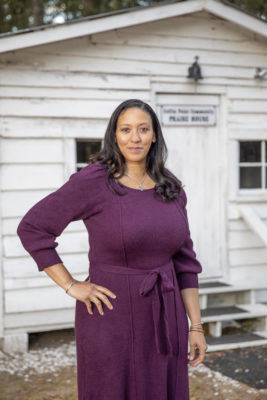 Weekly, Victoria visits the surrounding towns in the Gullah Geechee Corridor, discussing projects and educational outreach. “Although there are no offices in these areas, it is one of my goals to create satellites in each state.”
Weekly, Victoria visits the surrounding towns in the Gullah Geechee Corridor, discussing projects and educational outreach. “Although there are no offices in these areas, it is one of my goals to create satellites in each state.”
“I want to be of service to my people, our communities, and the Gullah Geechee culture,” she states. “It is imperative to include our culture in future teachers’ curriculum — culture, education, and the Gullah language.” Victoria learned the language from her Gullah father and her community. “This is a living and evolving language, not a dialect. Linguist Lorenzo Dow Turner recognized the language, and he is considered the father of the Gullah language.”
Victoria also shared some exciting news. The Gullah Geechee Corridor is relocating to Beaufort, SC, to an area yet to be disclosed. “Beaufort County is the center of the Corridor, and we will continue to promote and preserve our culture throughout the nation and beyond.”
While Victoria’s work is a priority experiencing her Gullah heritage is too. Watch Night is one of her favorite celebrations, which takes place on New Year’s Eve. “We join together in Houses of Worship to pray, sing, testify, express our gratitude, and watch the New Year come in reflecting on the past and present.”
Victoria continues her art influenced by her mother, enjoys her children and family, and is committed to her role as educator and promoter of Gullah culture. Pieces of history surround her on St. Helena Island. “The small prayer houses you see depict a time when enslaved people built a sense of family and community under a system of control.” The bodies of water running through Beaufort reinforce a tremendous supernatural force in the Gullah culture. Victoria continues, “It’s the most powerful force besides love.”
Victoria’s soft-spoken voice adamantly conveys her commitment to the Gullah Geechee culture and her people. Her commitment to the Gullah culture enriches us all.
“Ef Oonah en kno whe Oonah gwine, den Oonah shu kno whe Oonah cumfum.” Gullah language
“If you do not know where you are going, then you should know where you come from.” English

